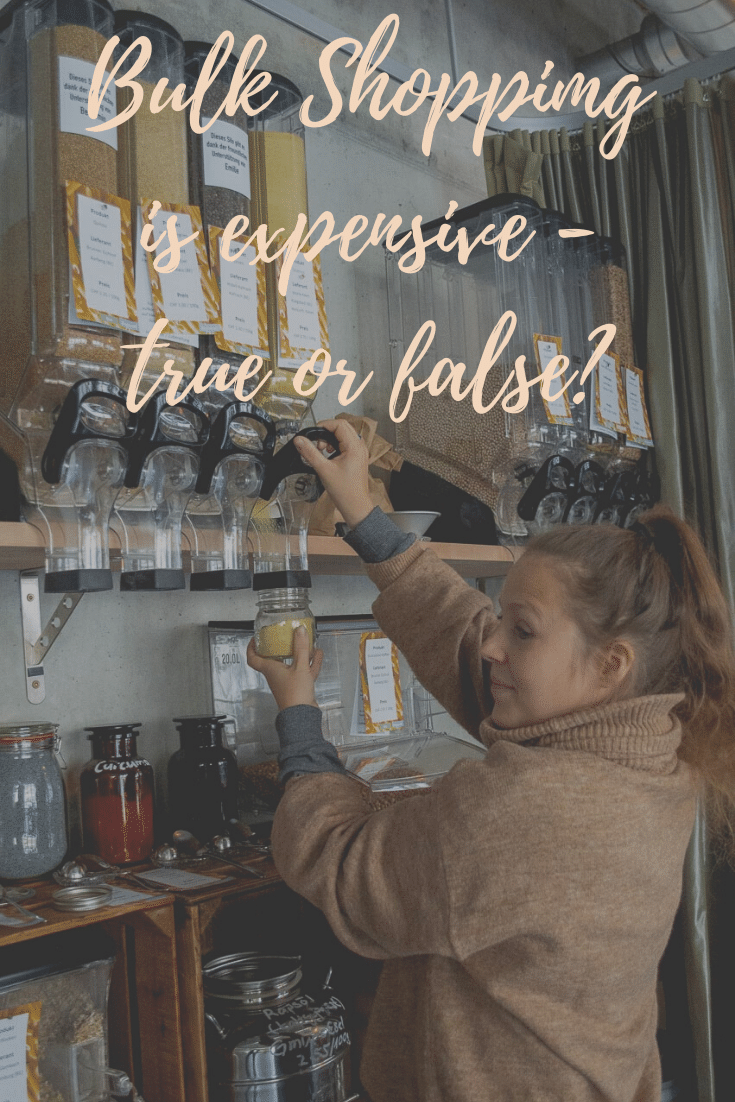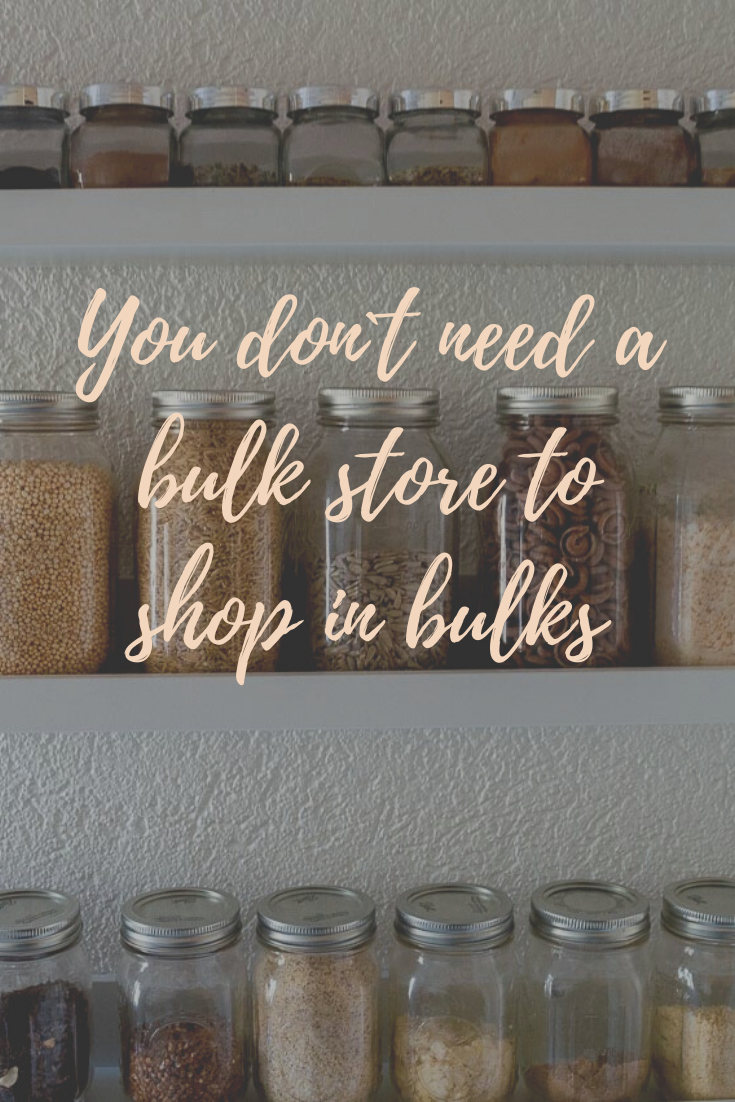This blog post also is available in German.
Where do you get the money to shop at the bulk store? A family with a normal income can’t afford that! I get asked this question very often. Absolutely understandable and rightly so. That’s why I’d like to go into more detail on the subject of “Bulk shopping is expensive” in a whole blog post on its own.

Organic or not – That`s the question
Whether a product has an organic seal or not makes a huge difference. Not only in terms of quality, but also in price. Because an organic product is in most cases more expensive than its counterpart without an organic seal. In return, you naturally get better quality and know that your product is not contaminated with chemicals and pesticides. And quality just costs its price.
Fact is organic products are more expensive and many unpacked shops sell organic and fair trade products. In Switzerland, a food product in organic quality can cost twice as much as one without the organic seal (even in regular supermarkets). This is why bulk shops sometimes have higher prices than a supermarket without organic food. And why people often think bulk shopping is expensive.
The decision whether you can or want to pay the extra price for organic quality, is on you. I can’t take that decision for you. It is a) a question of ideology and b) of course also a question of budget. But if you consume less animal products (especially meat and cheese), you’ll have more money available for high quality organic vegetables and legumes.
Conclusion
If you want to compare prices from unpacked shops with those in the supermarket, please make sure that you compare organic with organic. Otherwise, you`ll quickly come to the false conclusion: bulk shopping is expensive. And after all, you wouldn’t compare apples with potatoes either right? Check briefly whether it`s an organic product that you want to compare.
Unpacked = conscious consumption
If you deal with bulk shopping, then sustainability is certainly also close to your heart. However, living sustainably doesn’t only mean doing without plastic or producing less waste, but also questioning your consumption behavior in general.
Quality over quantity
Conscious consumption is an important component of a sustainable lifestyle. To ask yourself more often, do I really need this? Do I need to buy the umpteenth pair of shoes? Questions like these accompany you every day when you try to live a sustainable life. Therefore, you’ll probably save money automatically when you change to a conscious and sustainable lifestyle because you`ll not make so many unnecessary purchases anymore. At the same time, you`ll pay attention to high quality and fair production conditions, which will automatically ensure that you only consume what you need.
The same applies to unpacked shopping. In time, you`ll probably find out for yourself which foods you need and which aren’t really necessary. And you`ll save money by buying less food. Over time, you`ll mostly only refill/replace what you have run out and buy very little or no new stuff. This saves you money!
Expensive & unnecessary products are eliminated
In addition, some products that you would buy in the supermarket are omitted because they simply aren’t sold in bulk or because these products aren’t sustainably produced anyway. Bulk shops often have a much smaller range of products than supermarkets. This will again eliminate some products that you might not buy anymore if you switch to unpacked shopping.
Chocolate bars, a bag of chips, or a vegan ready-to-serve pizza automatically aren’t a choice anymore, as they’re not available in the unpacked store. This way you save money again completely unnoticed, because especially such highly processed products are expensive. And if you shop in the supermarket, you are constantly exposed to such stimuli, because the stuff just gets thrown in your face all the time. That can’t happen in the unpacked store.
Partly, whole product categories disappear completely, like expensive cleaning agents, convenience products, cosmetics or drugstore articles.
For example, you buy make-up pads made of fabric once or even sew them yourself. While you have to buy disposable pads over and over again. Or you can buy toothbrush tablets in large quantities so that they last a year and cost considerably less than the 3-4 tubes of toothpaste you need per year. In other words, if you buy in bulks and sustainable reusable products, you’ll save money in the long run rather than having to buy disposable products all the time.
Conclusion
If you pay attention to conscious consumption and sustainable products in your shopping, you’ll automatically save money. Because some food you’ve bought so far won’t be available in the unpacked shop. If you have enough time, you’ll maybe even make many things yourself at home to save packaging and money.
You’ll continue to grow according to the slogan: Quality instead of quantity and less is more! This will definitely save you money.

Bulks aren`t only limited to bulk stores
Shopping unpacked doesn’t necessarily mean going to the unpacked store. You can get some things unpacked with a little creative thinking and friendly questions without even entering a bulk store.
Bulks in the supermarket & on farmers market
Some supermarkets now also offer nuts and dried fruits in bulks. In addition, you can also buy organic quality vegetables and fruits without packaging. Even if the offer is still limited.
Otherwise, it`s worthwhile shopping at the weekly farmers market. There you`ll find fresh vegetables and fruits of excellent quality and unpacked. Sometimes you can also find other foods, such as antipasti, dried mushrooms, and fruits, bread, cheese, and meat or local honey in jars (for the non-vegans).
Specialty shops
Oil, vinegar and certain pickled vegetables or antipasti can sometimes be found unpacked in delicatessens. Respectfully you can have them filled into a container you brought along. In the coffee shop you can have coffee beans ground directly and filled into your jar.
In the bakery, you can ask for the bread to be given to you without paper bags. And if you still consume animal products, just ask nicely at the butcher’s or cheese dairy if they can fill your goods into the container you brought along.
Take-away & To Go
If you’re eating out or picking up take-away, just bring your own container, jute bag or napkin plus cutlery, so you won’t need any packaging from the take-away. The same applies for your coffee to go. Just take a reusable cup with you for the journey.
Homemade
If you plan a little time per week you can do a lot of things yourself. For example cleaning agents, care products or certain foods. You`ll save money again. And if you calculate the time you would need for the errands, you probably don’t invest much more in making things yourself.
Over time, a routine develops. If something is empty, you make another batch right away. And once you’ve prepared and done everything, it won’t take that much time at all. After all, not everything always goes out at the same time. And sometimes it doesn’t take more than 10 minutes to make cleaning agents or care products yourself.
Conclusion
You see, in many shops, which you may already be frequenting, there are possibilities to buy unpacked. Accordingly, you`ll not spend more than before. You already go to these shops anyway. Sometimes you even get a price reduction if you bring your own container.
It’s important to always ask nicely if you can have the products filled into your own container. It’ll take a little time until you find out where you can get what in bulk. I also advise you to always have certain items in your bag, such as jute bags, containers, or cutlery. This way you’ll always be prepared for a spontaneous unpacked purchase. But I’ll write an additional blog article on this topic.

It all depends on the location
Not all bulk shops are the same. What do I mean by that? How expensive the purchase and the products in a bulk store are depends on its location, size and rental costs.
For this article I compared my go-to bulk shop, with ohne.ch (Unfortunately, the prices at ohne.ch were only visible during the Corona crisis, now they are no longer listed). In any case, the prices at ohne.ch were sometimes cheaper than in my unpacked shop.
However, my unpacked shop probably has high rental costs due to its location. In addition, my bulk store is smaller and the range of products is also smaller, which is probably why it’s not always possible for them to negotiate lower prices with suppliers, as smaller quantities are purchased.
Conclusion
Inform yourself well where there are unpackaged shops in your area and compare – if possible – their prices. These can vary. Once you`ve done this work, you will know where you can get something cheaper. And don`t forget: Ask at your favorite Aunt Emma’s store, coffee shop or delicatessen what you could buy in bulks.
Prices in bulk stores vs. supermarket
Now the key question, how does it look like when we compare the prices of unpacked shops with those in the supermarket? Is it true that bulk shopping is expensive?
I compared the prices of my unpacked store with those of two big supermarket companies in Switzerland (Coop and Migros) and came to the conclusion that the products in the unpacked shop are actually more expensive. The difference in price varies from twice as much to a few centimes difference. Below you’ll find three examples. I`ve also compared the prices of ohne.ch with those of Coop and Migros. There the difference was smaller, respectively ohne.ch was not much more expensive than the supermarkets.
Here are three price comparisons between my go-to bulk store, Coop and Migros:
- macaroni: price in my unpacked shop 1.10.- per 100g, in the Coop 100g costs 0.50.- and in Migros 0.40.-.
- basmati rice: Price in my unpacked shop 0.90 per 100g, in the Coop 0.60 per 100g, and in Migros 0.56 per 100g.
- red lentils: Price in my unpacked shop 0.65 per 100g, in the Coop 0.52.- per 100g and in Migros 0.50 per 100g.
Conclusion
The products in the unpacked store can be minimal to significantly more expensive, depending on the desired product. Therefore, it’s recommended to analyze the individual prices of all products in advance and to compare them with other unpacked shops. Once you have invested the time for this analysis, you’ll know exactly where you can get what at the best price. You can also think about which products you are willing to pay a higher price for and where the price difference is only minimal.
If we look at the above example, you’ll see that the prices of basmati rice and red lentils are only slightly higher, but the ideological impact is much higher because you buy unpacked.
Don’t forget garbage fees!
In addition, if you buy unpackaged, you save on waste disposal charges, because you produce less waste. Another point you should take into account.

Bulk shopping is expensive – conclusion
Is bulk shopping really expensive? At first glance, it may seem so, if you just look at a direct price comparison between supermarket and bulk shop. However, if you go deeper into the matter and take other factors into account, then bulk hopping is actually cheaper at the end of the day.
That’s because you:
- Put quality before quantity
- buy less unnecessary stuff
- abandon finished goods
- only refill what is empty
- expensive items, such as cosmetics & cleaning agents are omitted
- go for reusable instead of disposable
- generally consume less, because less property = less cost
- save on waste disposal charges
Hopefully this article was helpful for you and could clear up the prejudice that bulk shopping is expensive.
And if you`re new to the subject of bulk shopping, this guide and my tips for bulk shopping are certainly very helpful for you in your everyday life. I`d also like to give you the following: take your time, go through the changeover step by step, and don’t stress yourself if you don’t succeed with bulk shopping every single time. Nobody is perfect!
If you need help or don’t know where to start with your transition to Zero Waste, just contact me via email. I will gladly help you with useful tips or support you with a 1:1 coaching to help you make the transition to a waste-free life.
Indem du meinen Newsletter abonnierst, erhältst du zudem Zugang zu meinem E-Book und anderen Freebies, wie auch exklusive Angebote & Inhalte direkt in dein Postfach. Zudem sende ich dir regelmässig die akt
By subscribing to my newsletter, you also get access to my ebook and other freebies, as well as exclusive offers & content directly to your inbox. I also regularly send you the latest recipes, personal insights and interesting tips and tricks on vegan nutrition and sustainability.
You can also contact me directly via the newsletter by simply replying to my emails. This allows me to respond more specifically to your questions and wishes. I am happy to welcome you as part of my community!
Read you soon
Your Sarah
